Cat Owner Responsibilities
As a responsible cat owner, it is essential to understand and fulfill a range of responsibilities for the well-being and happiness of your furry companion. Owning a cat is not just about providing food and shelter; it also involves ensuring its physical and mental health, offering a safe and stimulating environment, and being prepared for the commitment that comes with cat ownership. In this blog post, we will explore the various responsibilities that every cat owner should be aware of, offering guidance and insights into how to be a conscientious and caring caregiver for your feline friend. Let's delve into these responsibilities and discover how you can create a harmonious and fulfilling relationship with your beloved furball.
Ensuring access to fresh water at all times
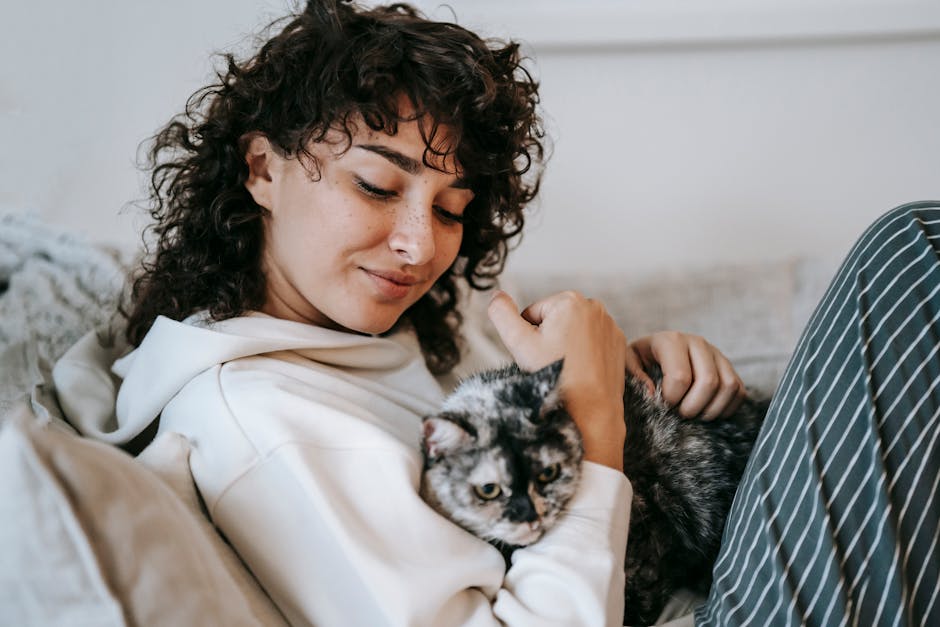
Ensuring access to fresh water at all times is an essential responsibility for all cat owners. Just like humans, cats rely on water to stay hydrated and maintain optimal health. Whether your cat primarily consumes wet or dry food, providing a constant supply of fresh water is crucial.
One of the easiest ways to ensure access to fresh water is by having several water bowls strategically placed around your home. Cats often appreciate having options, so having multiple water sources in different locations can encourage them to drink more. Consider placing water bowls in areas where your cat spends a lot of time, such as their favorite sleeping spots or near their food bowls.
Regularly cleaning and refilling the water bowls is also important. Cats are known to be fastidiously clean animals, and they may reject stagnant or dirty water. Make it a habit to clean the water bowls daily, removing any debris or hair and refilling them with fresh, cool water. Avoid using heavily scented detergents or cleaners, as cats are sensitive to strong smells.
In addition to bowls, you may also want to consider investing in a cat water fountain. These devices provide a constant flow of running water, which can be more attractive and enticing to cats. The flowing water not only keeps the water fresher for longer but also mimics a natural water source, which can help encourage your cat to drink more.
Monitor your cat's water intake to ensure they are staying properly hydrated. Cats typically consume about 3.5-4.5 ounces of water per 5 pounds of body weight per day. However, individual cat's needs may vary, so it's important to pay attention to your cat's drinking habits. If you notice any sudden changes, such as increased or decreased water intake, it could be a sign of an underlying health issue, and it's best to consult with a veterinarian.
Remember, providing access to fresh water is not only crucial for your cat's hydration but also for their overall well-being. By making sure your cat always has access to clean, fresh water, you are taking an important step in fulfilling your responsibilities as a cat owner.
Creating a safe and stimulating environment for the cat to play, explore, and rest
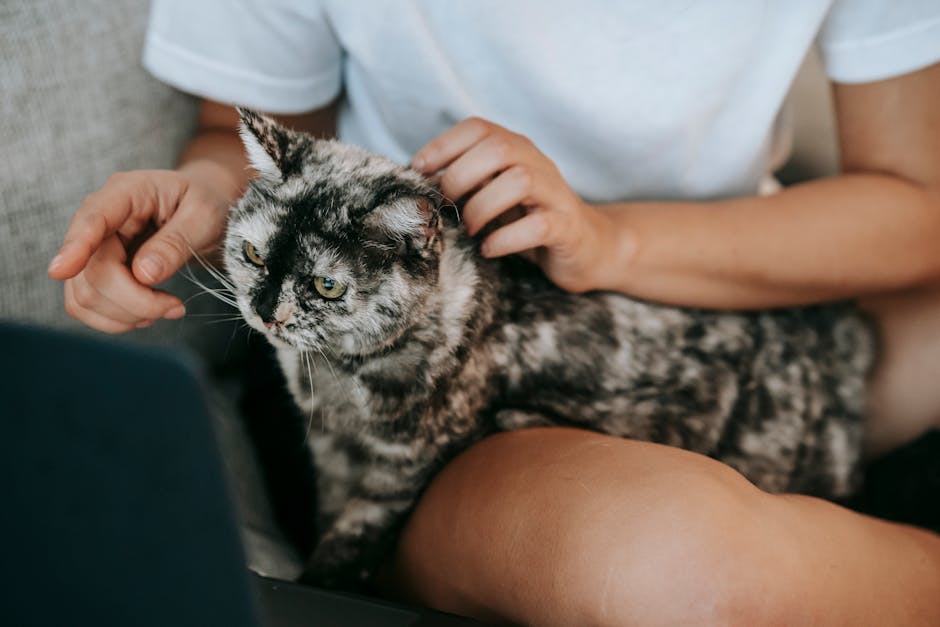
Creating a safe and stimulating environment for your cat is crucial to ensure their overall well-being and happiness. As a responsible cat owner, it is important to provide them with the necessary space and resources to play, explore, and rest comfortably.
First and foremost, ensure that your home is cat-proofed. This means removing any toxic plants or substances, securing loose cords or wires, and eliminating any potential hazards that could harm your feline friend. Consider investing in cat-friendly furniture, such as scratching posts or cat trees, to provide vertical spaces for them to explore and exercise their natural behaviors.
To stimulate their senses, rotate and provide a variety of toys that encourage play and mental stimulation. Interactive toys, such as puzzle feeders or treat-dispensing balls, can engage their hunting instincts and prevent boredom. Providing different textures and materials, such as feathers, crinkly toys, or catnip-filled toys, can also keep them entertained and engaged.
Cats love to observe their surroundings from elevated perches, so consider adding window perches or shelves near windows where they can watch birds or passersby. This can provide mental stimulation and entertainment, especially for indoor cats who may not have access to the outdoors.
Creating cozy and comfortable resting spots is equally important. Cats enjoy having their own private spaces to relax and unwind. Provide them with soft and warm bedding, preferably placed in quiet areas of the house where they can retreat for naps or solitude.
In addition to the physical environment, remember to spend quality time with your cat. Regular interactive play sessions using toys or laser pointers can help release their energy, strengthen the bond between you and your feline companion, and provide mental and physical stimulation.
By creating a safe and stimulating environment for your cat to play, explore, and rest, you are ensuring their physical and mental well-being. Your efforts as a responsible cat owner will not only contribute to their happiness but also foster a strong and loving relationship between you and your feline friend.
Providing regular and appropriate veterinary care, including vaccinations, deworming, and dental check-ups
As responsible cat owners, we have a duty to provide our furry companions with regular and appropriate veterinary care. This includes scheduling routine vaccinations, deworming, and dental check-ups for our feline friends.
Vaccinations play a crucial role in preventing the spread of highly contagious diseases and protecting our cats from potential health risks. Whether it's vaccinations for common viruses like feline herpesvirus or infectious diseases like feline leukemia, staying up to date with recommended immunizations is essential. As a responsible cat owner, you should consult your veterinarian to determine the appropriate vaccination schedule for your cat based on their age, lifestyle, and potential exposure.
In addition to vaccinations, regular deworming is equally important to maintain your cat's overall health. Intestinal parasites such as roundworms, tapeworms, and hookworms can cause severe discomfort and even lead to serious health problems if left untreated. Your veterinarian can recommend deworming treatments and advise you on the frequency based on your cat's lifestyle and risk factors.
We often neglect the dental health of our cats, but it is an essential aspect of their overall well-being. Dental problems can cause pain, discomfort, and even systemic infections if left untreated. Regular dental check-ups, cleanings, and, if necessary, dental procedures are necessary to ensure healthy teeth and gums for your cat. Your veterinarian can provide guidance on proper dental care techniques and may recommend dental diets or dental treats to help maintain your cat's oral health.
Remember, providing regular and appropriate veterinary care is not solely about addressing health issues when they arise but also preventing them through proactive measures. Your veterinarian is your best resource for guidance and advice on how to ensure your cat receives the necessary veterinary care, including vaccinations, deworming, and dental check-ups. By prioritizing these responsibilities, you are taking important steps in keeping your cat healthy, happy, and thriving.
Regular grooming to maintain the cat's coat and prevent matting

Regular grooming is an essential responsibility that every cat owner should take seriously. Apart from keeping your feline friend looking clean and well-groomed, it also plays a crucial role in maintaining the health of their coat and preventing matting. Matting occurs when the fur becomes tangled and knotted, leading to discomfort and potential skin issues for your beloved pet.
To prevent matting, it is recommended to groom your cat regularly, especially if they have long or medium-length fur. This includes brushing their coat using a suitable cat brush or comb. The frequency of grooming may vary depending on the breed and individual needs of your cat, but aim for at least a few times a week.
Start by gently brushing your cat's fur in the direction of hair growth. This not only helps to remove loose hairs but also stimulates the natural oils in their skin, promoting a healthy and shiny coat. Make sure to pay attention to areas prone to matting, such as behind the ears, under the armpits, and around the tail.
While grooming, be mindful of your cat's reactions. Some cats may find brushing to be a pleasant experience, while others may be more sensitive or less tolerant. If your feline friend becomes anxious or agitated during the grooming process, it's essential to approach it with patience and respect their boundaries. You can try using treats or positive reinforcement to create a more positive association with grooming.
For cats with stubborn mats, it might be necessary to carefully and gently remove them using a comb or your fingers. However, if the mat is large or too close to the skin, it is best to seek professional help from a groomer or veterinarian. Attempting to remove large mats by yourself can risk injuring the cat, and it's always better to prioritize their well-being.
Remember, regular grooming not only keeps your cat's coat mat-free but also allows you to monitor their overall health. During grooming sessions, look out for any skin abnormalities, such as redness, swelling, or signs of parasites. If you notice anything unusual, consult a veterinarian promptly.
By making regular grooming a part of your cat's routine, you are not only preventing matting but also bonding with your feline companion. It is an excellent opportunity for you to spend quality time together and show them how much you care.
Keeping the litter box clean and providing a suitable litter substrate

Keeping the litter box clean and providing a suitable litter substrate
One of the most important responsibilities of cat ownership is ensuring a clean and hygienic litter box for your feline companion. Cats are naturally clean animals, and they have an instinctual need to relieve themselves in a designated area. As a responsible cat owner, it is crucial to maintain a clean litter box to promote good health and hygiene for your cat, as well as a clean and odor-free home environment.
Cleaning the litter box regularly is essential to prevent any discomfort or health issues for your cat. Cats are meticulous creatures, and they prefer a clean litter box to do their business. Neglecting to clean the litter box can lead to soiled and dirty litter, which can discourage your cat from using it and result in them finding alternative spots to relieve themselves. This can create unwanted messes around your home and cause unnecessary stress for both you and your cat.
To keep the litter box clean, it is recommended to scoop out any waste or clumps of litter at least once a day. This ensures that your cat has a clean spot to do their business and prevents the build-up of odor. Additionally, completely changing the litter and washing the litter box with a mild detergent on a weekly basis is highly recommended. This will eliminate any lingering smells and maintain a clean and fresh litter box for your cat.
Equally important is providing a suitable litter substrate for your cat. Cats have preferences for certain types of litter, and it is essential to choose a variety that suits their comfort and needs. There are numerous litter options available on the market, such as clay, clumping, pine, or corn-based litters. Each type has its own advantages and drawbacks, so it may require some trial and error to find the one that your cat prefers.
When selecting a litter substrate, consider factors such as odor control, dust levels, and your cat's preferences. Some cats may be sensitive to scents or dust, so opting for unscented litter or low-dust formulas can be beneficial. Additionally, it is crucial to ensure that the litter granules are not too rough or uncomfortable for your cat's paws.
By keeping the litter box clean and providing a suitable litter substrate, you are ensuring the comfort, hygiene, and well-being of your beloved feline companion. This attention to detail will not only promote good litter box habits but also contribute to a harmonious and pleasant living environment for both you and your cat.
Offering opportunities for mental stimulation through toys, puzzle feeders, or interactive play
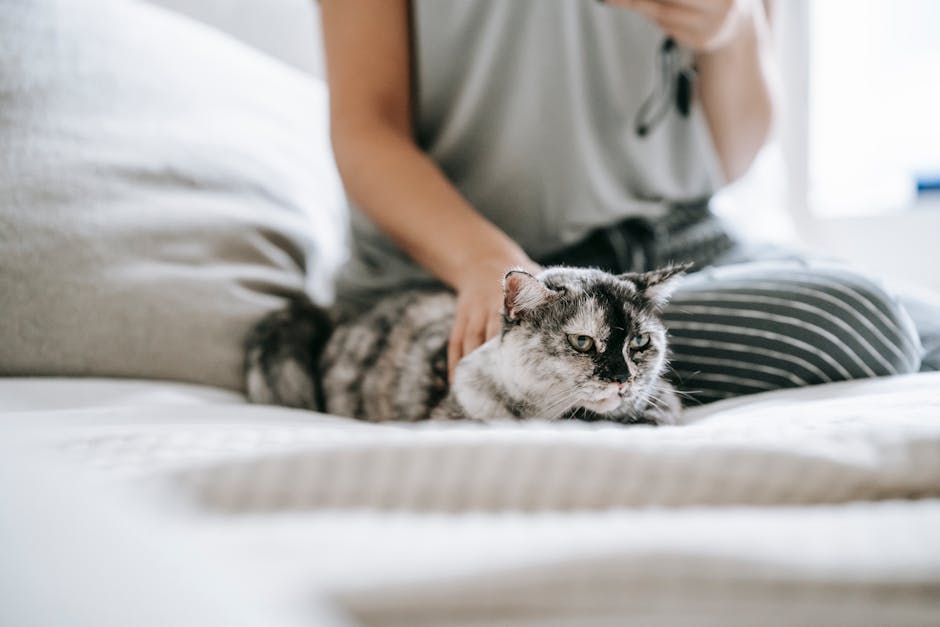
Providing mental stimulation for cats is an essential part of being a responsible cat owner. While cats may spend a significant amount of time lounging and napping, it is equally important to keep their minds engaged and active. Offering opportunities for mental stimulation through toys, puzzle feeders, or interactive play can greatly enhance their overall well-being.
Toys play a crucial role in keeping cats mentally stimulated. There is a wide array of toys specifically designed to challenge their hunting instincts and provide entertainment. Interactive toys that require cats to engage in physical activity or problem-solving, such as puzzle toys or treat-dispensing toys, are particularly beneficial. These toys not only keep cats entertained but also stimulate their natural instincts, prevent boredom, and promote cognitive development.
Puzzle feeders are another fantastic way to engage cats mentally while fulfilling their nutritional needs. These ingenious devices require cats to work for their food by solving puzzles or manipulating obstacles to access their meals. Not only does this keep them mentally active, but it also slows down their eating pace, preventing digestive issues like indigestion or vomiting.
Interactive play is essential for strengthening the bond between cats and their owners, while also providing mental stimulation. Spending quality time engaging in interactive play, using wand toys or laser pointers, not only keeps cats physically active but also sharpens their mental agility. This type of play mimics their natural prey instincts, encouraging them to pounce, chase, and exercise their problem-solving skills.
It's important to remember that mental stimulation should be a regular part of a cat's daily routine. Introduce new toys or rotate them regularly to sustain their interest. Additionally, provide ample opportunities for interaction and playtime, ensuring that cats have an outlet for their energy and mental stimulation.
By offering a variety of toys, puzzle feeders, and engaging in interactive play, you are not only keeping your feline companion entertained but are also promoting their overall well-being. A mentally stimulated and content cat is less likely to exhibit behavioral problems and is more likely to lead a happy and fulfilling life.
Regularly checking for signs of illness or distress and seeking veterinary help when needed
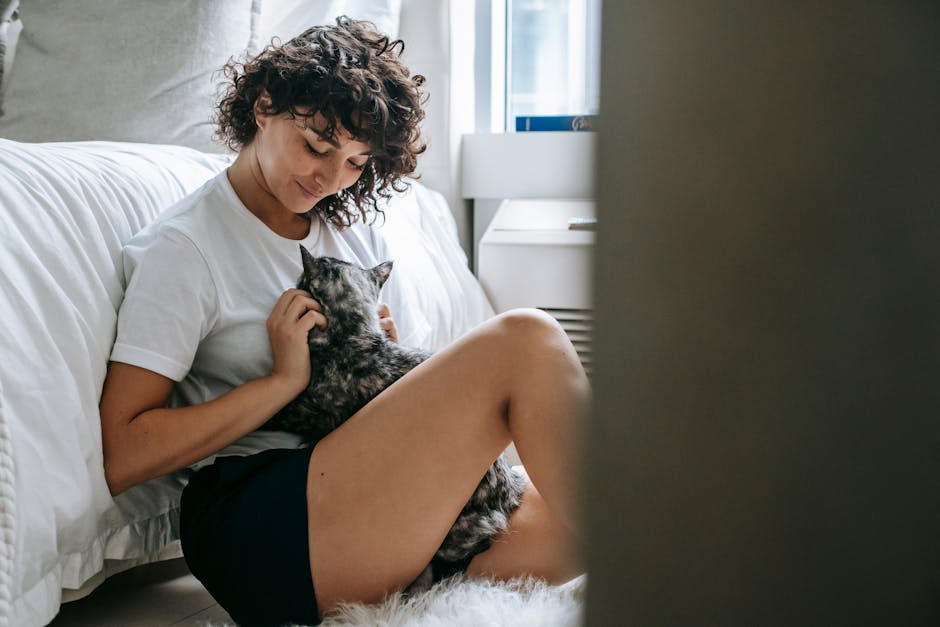
As responsible cat owners, it is crucial to regularly check for signs of illness or distress in our feline companions. Cats, by nature, are adept at hiding their pain or discomfort, making it essential for us to be observant and proactive in their healthcare.
Regularly observing your cat's behavior, appetite, and physical condition can help you identify any changes that may indicate an underlying health issue. Keep an eye out for significant changes in eating habits, drinking patterns, litter box usage, grooming behavior, or energy levels. These alterations could signify various illnesses, such as urinary tract infections, kidney disease, diabetes, or dental problems.
In addition to monitoring their day-to-day activities, regular physical examinations are vital to detect any potential health concerns. Schedule routine check-ups with a trusted veterinarian to ensure that your cat receives a comprehensive examination, including vaccinations, parasite prevention, and general wellness evaluations. Remember, prevention and early detection are key to maintaining your cat's long-term health and well-being.
If you notice any signs of illness or distress in your cat, don't hesitate to seek veterinary help promptly. Delaying medical attention can worsen the condition and lead to further complications. Always consult with a professional who can provide accurate diagnosis and appropriate treatment options tailored to your cat's specific needs.
When visiting the veterinarian, it is essential to provide them with accurate information about your cat's symptoms, behavior, and any changes you may have noticed. Being proactive in sharing information can assist the veterinarian in making an accurate diagnosis and prescribing suitable treatments. Remember that veterinarians are the experts in animal healthcare and can guide you in making the best decisions for your furry friend.
By regularly checking for signs of illness or distress and promptly seeking veterinary help when needed, you are demonstrating responsible ownership and ensuring the well-being of your beloved cat. Your attentiveness and proactive approach to your cat's health will help them live a long and happy life as part of your family.
Providing adequate exercise and opportunities for physical activity to prevent obesity and promote a healthy weight
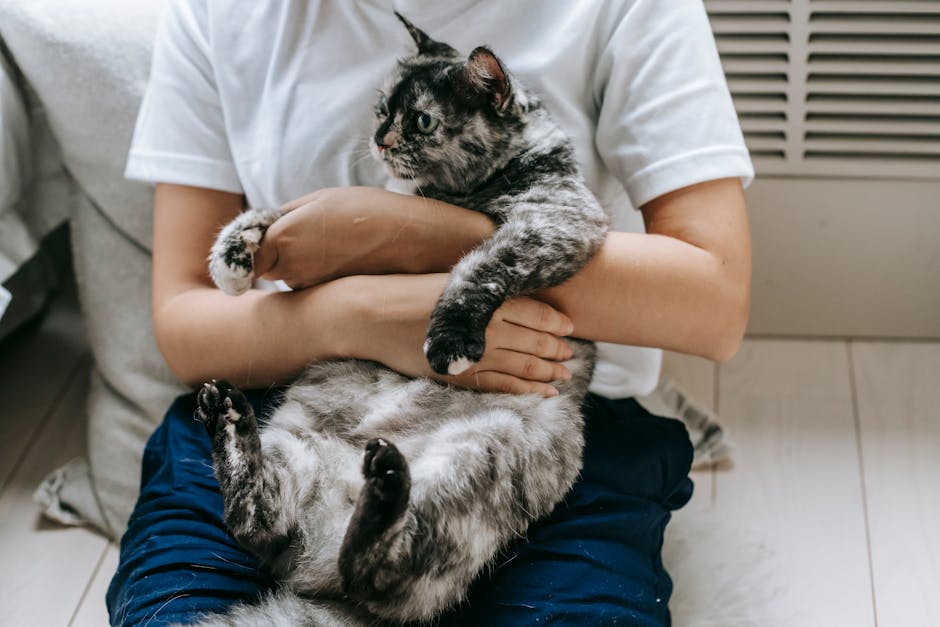
Cats, like any other pets, require regular exercise and opportunities for physical activity to maintain a healthy weight and prevent obesity. As a responsible cat owner, it is crucial to provide adequate exercise for your furry friend to ensure their overall health and well-being.
One way to promote physical activity is by engaging in interactive play sessions with your cat. Choose toys that encourage movement and capture their interest, such as feather wands, laser pointers, or interactive treat puzzles. By actively participating in playtime, you not only stimulate your cat's natural hunting instincts but also provide them with an outlet for their energy.
In addition to interactive play, creating an enriched environment can also help promote exercise. Consider providing your cat with a variety of climbing structures, scratching posts, and perches. These will encourage your cat to engage in vertical activities, allowing them to stretch, jump, and climb. Remember to rotate and refresh their toys and play areas regularly to keep them engaged and prevent boredom.
Another important aspect of exercise for cats is allowing them access to outdoor spaces, provided it is safe and secure. Outdoor enclosures or cat-proofed gardens can provide ample space for your cat to explore and play while minimizing the risks associated with roaming freely outdoors. However, always ensure that the outdoor area is escape-proof and free from potential hazards like toxic plants or other animals.
If keeping your cat indoors is necessary or preferred, you can consider creating a dedicated indoor playground for them. Place cat-friendly obstacles like tunnels, hiding spots, and perches throughout your home to encourage movement and exploration. Additionally, providing window perches or bird feeders outside can provide visual stimulation, giving your cat something to watch and be entertained by.
It is important to note that the exercise needs of cats vary based on their age, breed, and overall health. Consult with your veterinarian to determine the appropriate amount and type of exercise for your cat. They will be able to provide personalized recommendations based on your cat's specific needs.
Remember, regular exercise is not only essential for maintaining your cat's weight but also helps prevent behavior problems that can result from pent-up energy. By providing adequate exercise and opportunities for physical activity, you can help your cat lead a healthy and fulfilling life.




